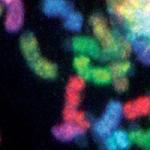
Research Topics
To study epigenetic mechanisms of development and differentiation across the mammalian genome, Dr. Zhao wanted a comprehensive and unbiased approach that would avoid the selection bias inherent in synthesizing probes for DNA microarrays. He and his colleagues therefore developed novel sequencing-based methods to study the epigenome, such as ChIP-Seq, which combines chromatin immunoprecipitation (ChIP) with the Next Generation Sequencing technique, and micrococcal nuclease sequencing (MNase-Seq). In addition they developed accompanying computational strategies to analyze the wealth of resulting sequence data. These tools are now widely applied in laboratories around the world.
His laboratory applies these techniques to mapping epigenomes in hematopoietic cell lineages. In the first comprehensive description of a human epigenome, Dr. Zhao and his colleagues showed that different genomic regions in human CD4+ T cells were associated with histone methylation and acetylation patterns that differentially marked enhancers, promoters, and gene body regions of transcribed or silenced genes.
Their findings displaced the simple model that histone deacetylases (HDAC) are bound to repressed genes while histone acetylases (HAT) are bound to active genes. Using a genome-wide approach, Dr. Zhao and his colleagues discovered that HDACs are also highly enriched at active genes whereas in silenced genes, both HATs and HDACs are bound at low levels. They found that inhibitors of HDACs prompted much higher acetylation levels at both inactive genes and active genes. This led to the hypothesis that HDACs operate dynamically to reset chromatin after RNA polymerase II directs transcriptional elongation at active genes, whereas HDACs and HATs function together to maintain inactive genes at a poised state that can be induced rapidly in response to environmental cues.
Dr. Zhao also provided the first genome-wide description of nucleosome positioning in the mammalian genome, describing the location of nucleosomes relative to transcriptional start sites in CD4+ T cells and demonstrating extensive nucleosome reorganization in promoters and enhancers following T cell receptor signaling.
Using the tools he has pioneered, Dr. Zhao has built a schema of modifications associated with particular areas of the genome; now, he wants to understand how they are regulated and how regulatory mechanisms contribute to processes like cellular memory, differentiation, and pathology. His laboratory is studying how the interplay between transcription factors and various chromatin modifying enzymes, including both histone modifying enzymes and ATP-dependent chromatin remodeling complexes, regulates the dynamic epigenomic landscapes in various hematopoietic lineages. Dr. Zhao is also investigating how epigenome dynamics regulate memory and function during differentiation of induced pluripotent stem (iPS) cells and hematopoietic stem cells to various blood lineages.
Additionally, Dr. Zhao is looking beyond two-dimensional relationships in the genome that regulate gene expression. It is known that the position of a specific gene in the nucleus is important for its regulation and expression—for example, evidence in yeast suggests that genes located at the nuclear periphery are repressed. Dr. Zhao aims to understand the three-dimensional organization of the nucleus as it relates to gene expression.
Biography
Keji Zhao received his undergraduate degree from Changwei Normal College in Weifang, China in 1980, his M.S. degree from Northeast Normal University in Changchun, China in 1985, and his Ph.D. from the University of Geneva, Switzerland in 1996. He was a Damon Runyon-Walter Winchel Cancer Research postdoctoral fellow at Stanford University in the laboratory of Gerald Crabtree. Dr. Zhao joined the NHLBI in 1999 and was appointed a Senior Investigator in 2007 and the Director of the Systems Biology Center in 2011. He received the NIH Director’s Award in recognition of innovative contributions that have provided novel insights into epigenetic control of gene expression in 2011 and NIH Merit Awards in 2007 and 2008. Dr. Zhao also received an APAO Award for Significant Accomplishments in Biomedical Research in 2008 and was elected a Fellow of the American Association for the Advancement of Science in 2012. Dr. Zhao has authored or coauthored more than 100 papers and book chapters. He is on the editorial boards of Genome Research and Cell & Bioscience.
Selected Publications
- Lai B, Gao W, Cui K, Xie W, Tang Q, Jin W, Hu G, Ni B, Zhao K. Principles of nucleosome organization revealed by single-cell micrococcal nuclease sequencing. Nature. 2018;562(7726):281-285.
- Jin W, Tang Q, Wan M, Cui K, Zhang Y, Ren G, Ni B, Sklar J, Przytycka TM, Childs R, Levens D, Zhao K. Genome-wide detection of DNase I hypersensitive sites in single cells and FFPE tissue samples. Nature. 2015;528(7580):142-6.
- Wang Z, Zang C, Cui K, Schones DE, Barski A, Peng W, Zhao K. Genome-wide mapping of HATs and HDACs reveals distinct functions in active and inactive genes. Cell. 2009;138(5):1019-31.
- Schones DE, Cui K, Cuddapah S, Roh TY, Barski A, Wang Z, Wei G, Zhao K. Dynamic regulation of nucleosome positioning in the human genome. Cell. 2008;132(5):887-98.
- Barski A, Cuddapah S, Cui K, Roh TY, Schones DE, Wang Z, Wei G, Chepelev I, Zhao K. High-resolution profiling of histone methylations in the human genome. Cell. 2007;129(4):823-37.
Related Scientific Focus Areas
This page was last updated on Thursday, August 21, 2025




